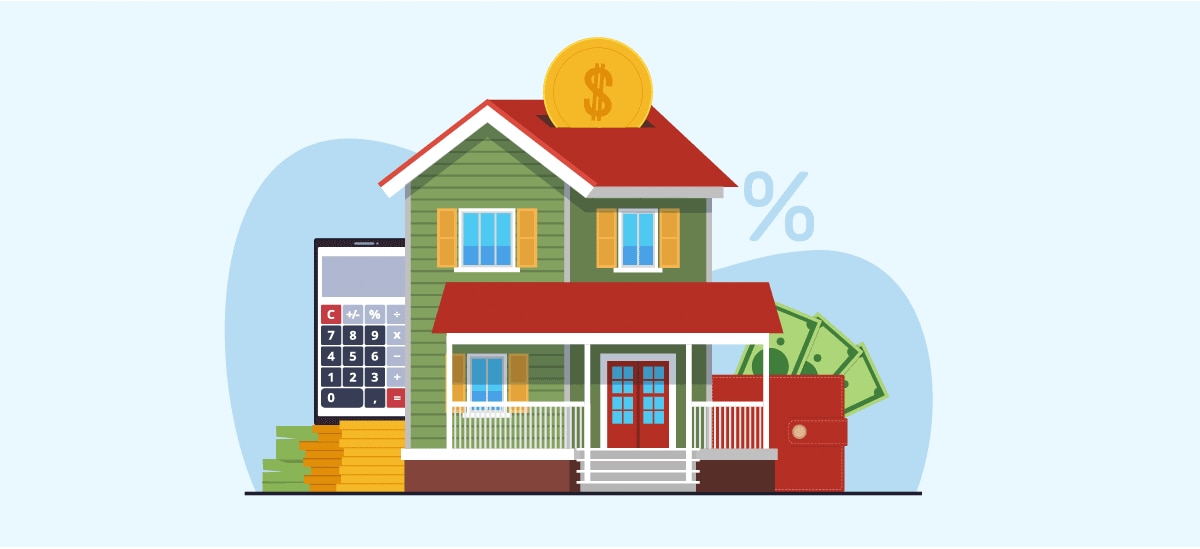
- The United States Department of Veterans Affairs (VA) offers home loan programs to make homeownership more attainable for military service members, veterans, and surviving spouses.
- VA loans offer favorable terms, including competitive interest rates, no private mortgage insurance requirement (however there is a funding fee), and a 0% down payment option for qualified Veterans with full entitlement.
- VA loans require a Certificate of Eligibility from the VA.
Veterans home loans, also called VA loans, are one of the benefits earned by the men and women who serve and defend our country in the U.S. military. These mortgage loans offer favorable terms to help veterans, active service members, and qualified surviving spouses buy, build, improve, or refinance a home.[1]
What Is a VA Loan?
A VA loan is a mortgage that is either backed by the Department of Veterans Affairs or offered from the VA directly to borrowers.
VA loans may be used by military service members and veterans who have met minimum active-duty service requirements, as well as qualified surviving spouses of qualified veterans.[2] This offer extends to those who have served in any branch of the military, including:[3]
- Air Force
- Army
- Coast Guard
- Marine Corps
- Navy
- Space Force
- National Guard
- Reserves
One advantage of VA loans is the 0% down payment option. This allows qualified borrowers with full entitlement to finance the full cost of a home, making homeownership accessible to those who lack a large down payment. It should be noted, however, that those who have money available for a down payment may want to invest it in the purchase. A down payment provides immediate home equity and reduces the total interest expense over the life of the loan.
VA Funding Fees and Closing Costs
All VA loans charge a funding fee.[4] This one-time, upfront fee takes the place of traditional mortgage insurance. Mortgage insurance is a policy that protects the lender in case the borrower defaults on the loan. This policy makes it possible for lenders to offer low down payment options. For other mortgage loan types, the borrower pays the cost of the mortgage insurance, but for VA loans, that cost is instead subsidized by taxpayers. The funding fee lowers the cost of the loan for the taxpayers.[4]
The VA funding fee currently costs up to 3.3% for a new purchase, depending on the type of loan used, the down payment amount, and whether the Veteran has full entitlement available.[4]
This funding fee is one example of a closing cost that must be paid before ownership of the property can be transferred. Other examples include title searches and escrow. You can estimate these fees with a closing cost calculator. It may be possible to roll these costs into the loan rather than paying them out of pocket. In some cases, the seller may be willing to pay some of these costs to incentivize you to choose their home. The VA allows sellers to cover costs up to 4% of the home loan amount.[4]
Types of VA Loans
There are four types of VA loans, including a backed purchase loan, a direct loan, and two refinance loan options.[5]
VA Home Purchase Loan
VA home purchase loans are mortgages issued by a third-party lender and backed by the VA. The VA guarantees that the lender can recover some, or all, of their losses if the borrower fails to repay the loan.[6] This guarantee allows lenders to offer favorable loan terms, such as the 0% down option, to eligible VA buyers.
VA home purchase loans are relatively flexible and can be used to:
- Buy a single-family home or a multi-family property with up to four units
- Buy a condo in a VA-approved project
- Buy a home and improve it
- Buy a manufactured home and lot
- Build a new home
- Make energy-efficient upgrades
VA purchase loans must be used for a primary residence. This means the borrower must live full-time on the property. VA loans cannot be used to purchase vacation homes, second homes, or investment properties. However, by purchasing a small multi-family building, living in one unit, and renting out the other(s), VA buyers can potentially use rental income from the property to help pay the mortgage.
Native American Direct Loan (NADL)
A NADL is a loan issued directly from the VA to the borrower. This VA loan is reserved for veterans who are Native American or married to a Native American and wish to buy or build a home on federal trust land. There are several eligibility requirements for this loan type, but the loan terms are favorable. For example, the interest rate for NADLs can be multiple percentage points below market rates.[7]
Interest Rate Reduction Refinance Loan (IRRRL)
Also known as VA Streamline Refinancing, IRRRLs are a popular option for refinancing an existing VA loan.[8] Refinancing means replacing an existing loan with a new loan under different terms. For example, if you currently have a VA loan that originated when interest rates were higher, refinancing with an IRRRL might help you secure a lower interest rate.
Cash-Out Refinance Loan
A VA cash-out refinance is similar to an IRRRL, but instead of refinancing the current loan balance, the borrower applies for more than the current balance, which allows them to pocket the difference after the old balance is repaid, or refinance an existing non-VA loan into a VA loan, for eligible Veteran borrowers.[9] This option provides a way for homeowners to convert some of their home equity into cash. Unlike traditional cash-out refinancing, which loans up to 80% of the home's value, VA cash-out loans may offer up to 90% of the home's value.
VA Loan Eligibility
Borrower Criteria
Criteria may vary slightly from one lender to the next, but borrowers generally need the following to apply for a veterans home loan:
- A Certificate of Eligibility (COE). This is an official VA document (VA Form 26-1880) that confirms your eligibility for the VA loan program based on time of active service.[2] You can request a COE online by signing into your VA.gov account.[9]
- A qualifying credit score. The VA does not have a minimum allowable credit score, but many lenders prefer credit scores of 660 or higher.
- Qualifying verifiable income. Lenders need to see proof of income to confirm that your household earns enough to repay the loan. Tax returns, pay stubs, and bank statements can all be used to show income.
Property Requirements
To qualify for a veterans home loan, the property must meet the VA’s Minimum Property Requirements (MPRs).
- Property type. The property must be the borrower’s primary residence. Qualified property types include single-family homes, multi-family homes with up to four units, condos in a VA-approved development, and manufactured homes.[6]
- Condition. The property must meet the VA’s Minimum Property Requirements (MPRs).[10] MPRs cover habitability requirements such as, but not limited to, a continuous supply of safe and potable water, no exposed electrical wiring, and a roof that is in good repair.
Pros and Cons of VA Loans
Potential advantages of VA loans include:
- Low down payment. Some borrowers may qualify for as little as $0 down.
- Competitive interest rates. Interest rates for purchase loans and refinancing are competitive with market rates, while NADLs offer rates below market.[7]
- No private mortgage insurance (PMI). There is no ongoing charge for mortgage insurance, as is common with other loan types.[6]
- Limited closing costs. Closing costs may be lower with a VA loan than with other loan types. Plus, the seller is permitted to help cover closing costs, up to 4% of the purchase price.[4]
Potential drawbacks of VA loans include:
- Strict appraisal process. A VA-approved appraiser will need to assess the condition and value of the property.[11]
- VA loan funding fees are required. Upfront loan funding fees may be paid at closing or may be financed into the loan itself. Fees range up to 3.3% of the loan amount, depending on factors like the down payment amount, loan program, and whether the borrower has full entitlement available.[4]
The Bottom Line
VA loans offer impressive benefits to qualifying military service members, veterans, and surviving spouses. You might be eligible for a down payment as low as $0, with low closing costs and a favorable interest rate.
Contact an MLO if you need any more information on VA loans.








 ©2025 The PNC Financial Services Group, Inc. All rights reserved.
©2025 The PNC Financial Services Group, Inc. All rights reserved.